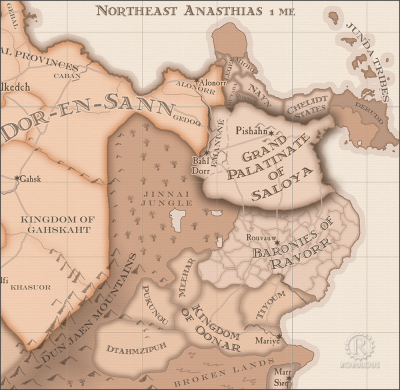Grand Palatinate of Saloya
The Grand Palatinate of Saloya, sometimes poetically referred to as the Rose Empire, was a historic Eloyoun nation in northeast Anásthiasplugin-autotooltip__small plugin-autotooltip_bigAnásthias
Anásthias [a-NAS-thee-ass / ænæsθiːæs], or [an-ass-THEE-as] is an equatorial island continent, heart of the Civilised World. The north straddles the equator and is hot and humid, while most of the equatorial centre is an upland plateau with fertile river valleys, and stretches of arid plains and desert in the shadow of the mountains. The south is temperate but more wild, separated from the civilisations of the north by the almost impassable Harthera. It was home to the Saloyan people and the Saloyan language. The Palatinate was a complex oligarchy, highly civilised and cultured. Until the start of the modern epoch it was the dominant regional power, a check to the eastward spread of the Empire of Dor-en-Sann.
Ancient Northeast Anasthias

This is in a series of articles about the ancient history of Northeast Anásthiasplugin-autotooltip__small plugin-autotooltip_bigAnásthias
Anásthias [a-NAS-thee-ass / ænæsθiːæs], or [an-ass-THEE-as] is an equatorial island continent, heart of the Civilised World. The north straddles the equator and is hot and humid, while most of the equatorial centre is an upland plateau with fertile river valleys, and stretches of arid plains and desert in the shadow of the mountains. The south is temperate but more wild, separated from the civilisations of the north by the almost impassable Harthera, before the founding of the modern nation of Hartheraplugin-autotooltip__small plugin-autotooltip_bigHarthera
This is in a series of articles about Harthera
* Name: Hartheran Union, Union of Harthera, Uhartrah * Government: Military-Mercantile Oligarchy * Capital: Vahltor * Foundation: 1 ME (Traditional) * Religion: Church of Hartrah * Language: Hartraan (official), also Saloyan, Rouvawetig, Junda.
History
The Palatinate was founded in the 8th century BMEplugin-autotooltip__small plugin-autotooltip_bigBME (Before Modern Epoch)
Used to date years Before the Modern Epoch. in the city of Pishahn. The exact date and history of the Palatinate is uncertain, but lists of rulers and their length of tenure gives the traditional date of 744 BME. The city historically was ruled by elders, with violent dictators and madmen seizing power, and a background of incursions by the Empire of Dor-en-Sann. The Palatinate was formed to put an end to this instability, and was largely successful.
The Palatinate maintained an uneasy relationship with the Empire, and in the third century BME signed a series of non-aggression and friendship treaties, with the Empire recognising Saloya as the pre-eminent regional power beyond its borders.
However with Imperial might waning in the 1st century, in 30 BME Saloyan forces under command of the 47th Palatine seized Emanuné, once an independent kingdom which had been annexed by the empire. The Saloyans built up defenses at key crossing points along the River Velun, establishing Emanuné as a buffer zone. Under the 48th Palatine in 23 BME, the Palatinate court took up winter residence at Biyahl, renamed Buldoya (modern Vahltor), strengthening military presence in the west and stabilising this new province.
In 2 MEplugin-autotooltip__small plugin-autotooltip_bigModern Epoch (ME)
The Modern Calendar is a dating system acknowledged throughout the Civilised World. It numbers years from the Modern Epoch, abbreviated ME and BME (Before Modern Epoch). It is also called the Modern Era.
Calendar
This is in a series of articles about calendars and dating systems.OrorrHartheraHMOrorrHartheraOrorrOrorrHMHartheraHMHartheraOrorr a chance attack by Junda raiders on the winter court at Buldoya killed the 50th Palatine Crisagiss Heltay, and key members of the ruling class, with Emanuné seized by the Junda. In the power vacuum the Palatinate plunged into a civil war from which it never recovered.
Government
The palatinate was ruled by a patrician class of wealthy aristocrats, who elected a leader, the Palatine, from among their ranks. Palatines served for life, or until they were deposed by a two-thirds vote of patricians.
All patricians had to pay an annual fee to maintain their rank, meaning that only the wealthy and successful stayed in power. When a palatine died or was otherwise deposed, candidates for palatine rank had to pay a huge sum to become a candidate to election, with a further sum to be paid on their election. This sum was flexible, but palatinate candidates often made fabulous promises of donations to the exchequer as part of their election campaign. Palatines regularly almost bankrupted themselves during elections, with supporters donating sums of money to fund their campaign. Consequently, usually only the wealthy established aristocracy gained the title of Grand Palatine.
Noted Rulers
| No. | Start | End | Name | Notes |
|---|---|---|---|---|
| 47th | 35 | 28 BME | ||
| 48th | 28 | 14 BME | ||
| 49th | 14 | 12 BME | ||
| 50th | 12 BME | 2 ME | Crisagiss Heltay | Killed by Junda |
| 51st | 2 | 7 ME | Spatan Hemulóchay | Assassinated |
| - | 7 | 20 ME | Interregnum | Second Civil War |
| 52nd | 20 | 23 ME | Pictesis Soumay | Victor of the Civil War |
